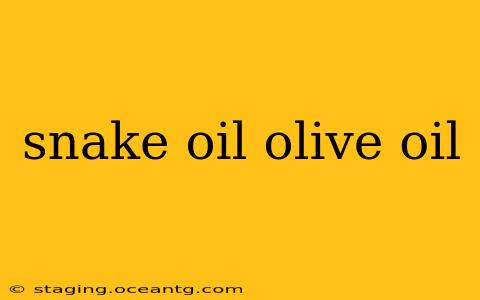The term "snake oil" is synonymous with fraudulent or ineffective products. But when it comes to olive oil, the term "snake oil olive oil" points to a worrying trend: the adulteration and mislabeling of olive oil, leading consumers to believe they're buying high-quality extra virgin olive oil when, in reality, they're getting something far inferior – or even something else entirely. This article will explore the deceptive practices behind "snake oil olive oil" and equip you with the knowledge to choose authentic, high-quality products.
What is "Snake Oil" Olive Oil?
"Snake Oil" olive oil refers to olive oil that is mislabeled, adulterated, or otherwise not what it claims to be. This can manifest in several ways:
- Adulteration: Mixing cheaper oils (like sunflower, soybean, or even refined olive oil) with extra virgin olive oil to increase profit margins. This lowers the quality and health benefits significantly.
- Mislabeling: Selling lower-grade olive oils (like refined olive oil or virgin olive oil) as extra virgin olive oil. Extra virgin olive oil has the highest quality standards and commands a higher price.
- Fraudulent sourcing: Claiming the olive oil comes from a specific region or uses a specific type of olive when this isn't true. This is especially prevalent with oils claiming to originate from popular regions known for high-quality olive oil production.
- Oxidation: Selling olive oil that has been improperly stored or transported, leading to oxidation and a decrease in quality and health benefits. Oxidized oil will have an off-flavor and reduced nutritional value.
How Can You Identify Snake Oil Olive Oil?
Unfortunately, identifying "snake oil" olive oil requires a keen eye and some knowledge. Here's what to look for:
- Price: Be wary of extremely cheap olive oil, especially extra virgin. Authentic extra virgin olive oil requires significant resources to produce, and the price reflects that.
- Labeling: Look closely at the label for terms like "pure olive oil," "light olive oil," or "olive oil." These are lower-grade oils. Extra virgin olive oil should clearly state that it is extra virgin. Check for the country of origin and the specific olive varieties used (if possible).
- Appearance: The color of olive oil can vary, but it should be generally clear and bright. Cloudy or sediment-heavy oil may indicate a problem.
- Smell and Taste: Extra virgin olive oil should have a fruity and slightly peppery aroma and taste. Rancid oil will have a bitter or unpleasant taste and smell.
- Certification: Look for certifications from reputable organizations that ensure the quality and authenticity of the olive oil.
What are the Health Risks of Consuming "Snake Oil" Olive Oil?
While consuming adulterated olive oil is unlikely to cause immediate health problems, it undermines the potential health benefits of genuine extra virgin olive oil. These benefits include a rich source of monounsaturated fats, antioxidants, and anti-inflammatory compounds. Consuming a product lower in quality or containing other oils will diminish these positive effects. Furthermore, some adulterants may have negative health consequences in higher concentrations.
How Can I Ensure I'm Buying Authentic Olive Oil?
Several steps can help you avoid buying "snake oil" olive oil:
- Buy from reputable brands and retailers: Choose well-known brands with a commitment to quality.
- Read reviews: Check online reviews and ratings before purchasing.
- Buy from local producers if possible: This allows you to learn more about the production process.
- Taste-test: If you can, taste a small amount of the olive oil before committing to a larger purchase.
Is all olive oil from a specific region high-quality?
No, not all olive oil from a region known for high-quality olive oil is automatically superior. Many factors influence the quality of olive oil, including olive variety, harvesting methods, processing techniques, and storage conditions. Even within a specific region, the quality can vary greatly among producers.
Are there any tests I can perform at home to check the quality of olive oil?
While there aren't foolproof home tests, you can assess the oil's quality by its appearance, aroma, and taste. Cloudy oil, a rancid smell, or an unpleasant taste are red flags. However, these are subjective evaluations, and a professional lab test is the only reliable method for precise analysis.
By understanding the deceptive practices involved in the sale of "snake oil" olive oil and taking the necessary precautions, you can ensure you're buying a high-quality product that offers the health benefits and culinary enjoyment of authentic extra virgin olive oil.
